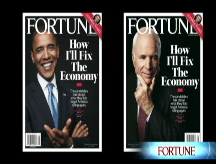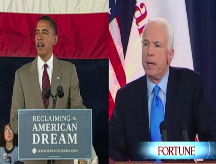The anti-doomsday scenario
Believe it or not, we have a pattern of defeating economic downturns. Here's one way out this time.

(Fortune Magazine) -- The trouble with gloom is that when you're surrounded by it, that's all you can see. A sunny tomorrow could be on its way, but the present darkness is definite. Obviously I'm talking about the economy, not the weather, and I'd like to propose the radical thought that, contrary to the evidence that surrounds us right now, just possibly the apocalypse is not at hand.
Today's pervasive pessimism certainly seems well founded. Oil above $130 a barrel is a massive tax on the U.S. economy. Sharply falling home prices are panicking U.S. consumers. Their inflation-adjusted total compensation hasn't risen significantly in years, and the prospects don't look good after the latest jobs report, which showed a big jump in unemployment. You can't blame people for feeling miserable - the consumer confidence index just hit a 16-year low - or for cutting way back on spending. Since consumers power the U.S. economy, economists figure a recession is on its way or already here. And since this recession (if that's what it is) seems driven by very large forces, it's hard to see what might turn it around.
So it's important to remember that we've been here before. The closest parallel was the miserable '70s and early '80s, when stocks went nowhere for years, stagflation dragged on, the dollar tanked, and oil prices rocketed. America's economic model no longer worked, we thought, and Japan's superior system would slowly but surely grind us to dust. No one could see the solution, yet our system found it. U.S. industry restructured - painfully - and has since produced more than 20 years of impressive growth, interrupted only by the mini-recessions of 1990--91 and 2001.
The way we get out of today's slump will be different. Here's one plausible scenario. Home prices, down 17% from their peak, stop falling in most of the country by year-end. The financial system clears out the last remnants of subprime junk; by the fourth quarter, credit eases back to near-normal levels. The oil price bubble bursts as today's high prices eventually bring forth lots of new production (see Shawn Tully's column). Even if unemployment goes to 6% from today's 5.5%, people remember that it hit 6.3% just five years ago, when the economy was growing. Finally consumers can breathe - and spend - again. Traumatized by the housing bust, they don't spend as freely as in the old days. (But that's good. They'll need savings years from now when Washington is forced to squeeze Medicare benefits.)
In the bigger picture, new industries arise from today's turmoil. Environmental technologies create efficiencies far greater than anything needed to meet recent high energy costs; the whole economy becomes more efficient, and the world buys these new technologies in volume. Biotech develops devices and therapies that help not just aging Americans but billions worldwide. More companies apply the creativity-based business models of Apple (AAPL, Fortune 500) and Target (TGT, Fortune 500) in other industries, resulting in new categories of jobs unimagined today.
How do I know any of this will happen? I don't. In fact, I'm practically certain things won't play out just as I've described; the future always fools us. But I do know that our system has a genius for producing solutions that no one individually can see. And I know that our capital markets are still the world's best at allocating resources, and that our peculiarly American talents for risk taking, problem solving, and imagining are especially valuable in today's global economy.
It's a bit unsatisfying to say that we should simply believe things will get better without being able to say how. In fact, that position is easy to ridicule as Pollyanna-ish. Yet in previous tough times, that has been exactly the correct position to hold. Right now, when seeing beyond the gloom is so difficult, is a good time to remember it. ![]()
-
 The retail giant tops the Fortune 500 for the second year in a row. Who else made the list? More
The retail giant tops the Fortune 500 for the second year in a row. Who else made the list? More -
 This group of companies is all about social networking to connect with their customers. More
This group of companies is all about social networking to connect with their customers. More -
 The fight over the cholesterol medication is keeping a generic version from hitting the market. More
The fight over the cholesterol medication is keeping a generic version from hitting the market. More -
 Bin Laden may be dead, but the terrorist group he led doesn't need his money. More
Bin Laden may be dead, but the terrorist group he led doesn't need his money. More -
 U.S. real estate might be a mess, but in other parts of the world, home prices are jumping. More
U.S. real estate might be a mess, but in other parts of the world, home prices are jumping. More -
 Libya's output is a fraction of global production, but it's crucial to the nation's economy. More
Libya's output is a fraction of global production, but it's crucial to the nation's economy. More -
 Once rates start to rise, things could get ugly fast for our neighbors to the north. More
Once rates start to rise, things could get ugly fast for our neighbors to the north. More









